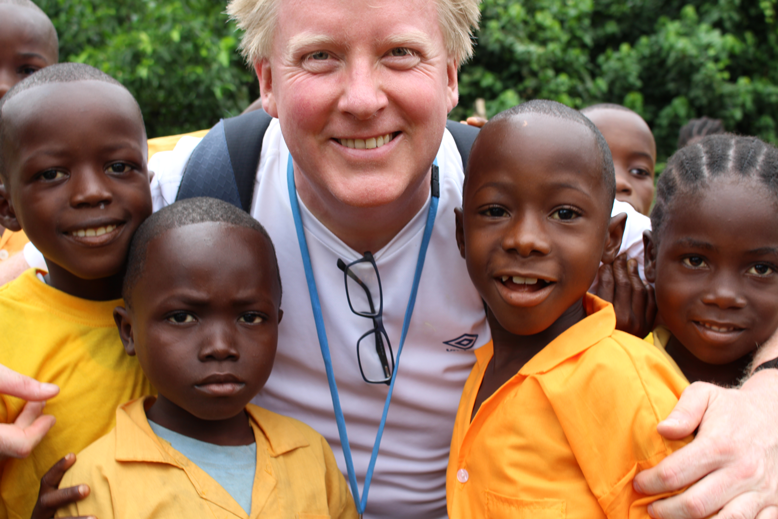Life in Liberia: The Mary’s Meals community
Our communications officer Gerry explains the sense of community that is at the heart of Mary’s Meals’ work in Liberia.
I was walking back to the Mary’s Meals compound in Tubmanburg one day with two friends and they were amazed at how many people we passed knew my name and greeted me. The closer we got, the more often I heard voices from all sides of the track – from houses, yards, gardens, even from one person passing on a motorbike – calling: “Gerry!” and I would turn and wave or greet them back. Quite a few, usually children, were people I didn’t even know.
When I first arrived, though, it was slightly different. The call to me from the children when I passed was “hey you!” But when they got more used to me, a lot of the kids would shake my hand, calling me Gerry and enquiring about my health and well-being!
The strength of the welcome and sense of community is often something that visitors remark on when they come to Liberia. It can be overwhelming for those of us used to a casual nod, or just a grunt, or mostly nothing.
I was back home in the UK recently on holiday. It was only for nine days, but when I returned to Liberia the reception I got was amazing. People I barely knew in Mary’s Meals came up to me personally to say “Welcome back”. Those I actually worked with greeted me like I’d been away for months.

Community here is different, as it is the essential safety net for people. If you are sick, lose your job or can’t provide a home or food for your family, then you turn to your community – your family and friends – to help you. And it is understood that when you ask, they will do whatever they can to help.
Mary’s Meals is offering itself to be part of that arrangement, and it’s sometimes a bit strange to people here that you can have an organisation as part of your community as well as individuals. But people – especially in Tubmanburg where we’re based – appreciate the efforts of Mary’s Meals’ field staff to work with the local schools to form a partnership with communities at a local level.
There are schools that are founded entirely on a voluntary footing. I was in one recently that came about because a teacher moved into a new area and realised there was no school. He started teaching a few classes himself, while encouraging the community to get involved. They recruited some teachers and some of their own high school graduates, as volunteers at first, and gradually got them through teacher training.
Inside the schools, there is a community not just of staff and pupils, but of parents, governors and volunteers, especially the cooks who take on the job of cooking the Mary’s Meals food every day.This is a fantastic example of the part Mary’s Meals can play in the community.
My friend from Radio Bomi, who was accompanying me on my neighbourhood ramble, told me that whenever they have a phone-in asking listeners to rank local organisations in terms of how much they appreciate what they are doing, Mary’s Meals invariably comes out on top.
I thanked him for that, but I said his next challenge is to get his face as well known in the community as mine!
Il suffit de $31.70 pour nourrir un enfant pendant toute une année scolaire.
